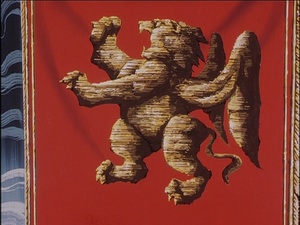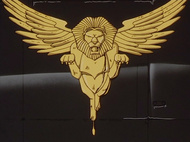New Galactic Empire
From Gineipaedia, the Legend of Galactic Heroes wiki
The New Galactic Empire or Neue Reich was founded by Reinhard von Lohengramm in 799 UC (1 NIC / 490 IC / 3599 CE), following the conquest of the Free Planets Alliance at the end of the first Alliance–Imperial War. The capital of the New Galactic Empire, is the New Imperial Capital, located on the planet Fezzan. Its flag was a golden winged lion rampant on a crimson red background. The crest as depicted on warships was a winged lion leaping towards the viewer.
Contents |
History
Foundation
After defeating the High Nobles in the Imperial Civil War and deposing Imperial Minister of State Klaus von Lichtenlade, Reinhard von Lohengramm was the sole political and military authority in the Galactic Empire. Reinhard immediately began reorganizing the social and political structure of the empire: he abolished the caste system and redistributed the property and assets of the nobles; he instituted many progressive legal and social welfare reforms; and he eliminated corruption and graft within the Imperial government. (LOGH: 'First Battle')
When former High Nobles abducted the young figurehead of the old Imperial line, Kaiser Erwin Josef II to the Free Planets Alliance to establish a government-in-exile in 797 UC (488 IC / 3597 CE), Reinhard, with overwhelming popular support, declared his intention to invade the Free Planets Alliance and to eliminate the vile High Nobles once and for all. (LOGH: 'The Abduction of the Young Emperor')
Reinhard seized control of the Dominion of Fezzan, making the formerly autonomous (and neutral) territory the forward-base for his invasion of the Free Planets Alliance. Overconfident in the defensive abilities of Iserlohn Fortress, the Alliance was unprepared for Reinhard's invasion. The Alliance hastily mustered its fleets and placed them under the command of veteran admiral Alexandre Bewcock, who attacked the Imperial invasion forces in the Rantemario Starzone. The Battle of Rantemario, despite the timely intervention of the Yang Fleet, saw the near-obliteration and utter defeat of the Alliance forces. (LOGH: 'The Two-Headed Snake: The Battle of Rantemario')
In a last-ditch effort to fend off the invaders, Yang Wen-li attacked Reinhard's personal fleet when it was isolated from the other invading fleets in the Vermilion Starzone, hoping to destroy the Brunhild and kill Reinhard, thus throwing the Imperial forces into confusion and disarray. Despite managing to claim a tactical victory in the Battle of Vermilion, Yang was forced to surrender to Reinhard after two Imperial fleets led by admirals Ruenthal and Mittermeyer conquered the capital planet of Heinessen, forcing the Alliance Supreme Council to surrender unconditionally. (LOGH: 'The Battle of Vermilion (Part One)', 'The Battle of Vermilion (Part Two)', 'Sudden Change')
Reinhard von Lohengramm generously allowed the Free Planets Alliance to retain their sovereignty and the right to self-rule when the Alliance–Imperial War was formally brought to a close with the Treaty of Ba‘alat. Returning to Odin with the whole universe conquered by his own hand, Reinhard von Lohengramm forced Catherine I to abdicate her throne, and declared himself emperor of the New Galactic Empire on the twentieth day of June 799 UC (1 NIC / 490 IC / 3599 CE). A new calendar, the New Imperial Calendar was started to mark the creation of the new pan-galactic state. (LOGH: 'Long Live the Emperor!')
Second Alliance–Imperial War
Rather than forcefully absorb the Free Planets Alliance into his new empire, Kaiser Reinhard von Lohengramm allowed the Alliance government to maintain a high level of autonomy, with duly-elected Supreme Chairman João Rebelo governing over the Alliance territories under the limited supervision of Imperial Admiral Helmut Lennenkampf, who acted in the role of "Imperial High Commissioner" on Heinessen. Rebelo would be forced to limit the freedoms of the Alliance citizens in order to avoid conflict with the Empire, and the Alliance economy would inevitably falter due to the sudden lack of wartime conditions. By allowing Rebelo to lead the Alliance, Reinhard constructed the circumstances in such a way that public opinion would inevitably turn against Rebelo, culminating with the people of the Alliance resenting their own government. The Neue Reich, by comparison, would seem benign, hastening the absorption of the Alliance into the Empire.
The increasing stress of office coupled with the anger of the people quickly proved too much for João Rebelo to bear, and his mental state became increasingly unstable as his time in office wore on: Rebelo forced himself to make hard, morally ambiguous decisions, believing that he had to do whatever necessary in order to preserve the autonomy of the Alliance. In late July 799, following admiral Willibald Joachim von Merkatz's raid on the Alliance warships that had been marked for decommissioning in accordance with the Treaty of Ba‘alat, Rebelo ordered the arrest and, soon after, the execution of Alliance war hero Yang Wen-li. His plan to turn Yang into a martyr for the Alliance and shift the blame to his former subordinates so as to preserve the semblance of Alliance independence failed however when the Rosen Ritter proved to be too strong for the remaining Alliance troops in Heinessenpolis to handle. The Rosen Ritter managed to rescue not only Yang, but also kidnapped Rebelo and Lennenkampf so as to secure a passage of freedom for Yang. When news of the crisis in Heinessen reached Reinhard, he saw it as a perfect opportunity to subjugate the Alliance once and for all and initiated the Second Alliance–Imperial War. (LOGH: 'The Magician Is Captured', 'Invitation to an Opera', 'Blood Running Down the Stairs: Cascade', 'Ragnarök Again')
Reuenthal's Revolt
...
The Iserlohn Republic
The New Galactic Empire did not formally recognise the formation of the Iserlohn Republic in 800 UC (2 NIC / 491 IC / 3600 CE). With the shifting of the Imperial capital to Fezzan, Iserlohn fortress lost its strategic importance. Reinhard's primary motivation for re-taking the fortress had been to fight against Yang Wen-li again. With Yang and the fortress's strategic importance both gone, the New Galactic Empire ignored the Republic.
When Oskar von Reuenthal revolted, precipitating another civil war in the Empire, Reuenthal made an offer to the Republic. He offered restoration of the Alliance's former territory if the Republic would side with him and bar the passage of Imperial reinforcements through the Iserlohn Corridor. After consideration, Julian Mintz declined the offer and allowed the Mecklinger Fleet of 11,900 ships to pass. (LOGH: 'Invitation to Rebellion')
Eventually in 801 UC (3 NIC / 492 IC / 3601 CE), the Republic decided to challenge the Empire militarily in order to demonstrate to former Alliance citizens that they were still dedicated to the ideals of republican democracy and to demonstrate to Reinhard that they had the strength to be worthy of negotiations with him. The resulting Eleventh Battle of Iserlohn was a victory for the Republic. As predicted, the defeat spurred Reinhard into action, eventually culminating in the Battle of Shiva. This final battle resulted in Reinhard agreeing to an armistice and equitable peace negotiations. (LOGH: 'A Challenge to Arms', 'The Beautiful Maiden Wants Blood')
Ultimately, in return for the return of Iserlohn fortress and the dissolving of the Iserlohn Republic, the New Galactic Empire agreed to the Ba'alat star system, including the planet Heinessen, becoming an internally self-governing autonomous zone, and the possibility of constitutional reforms and greater representative rule in the Empire as a whole. (LOGH: 'The Golden Lion Flag Loses Its Lustre', 'Dream: To See It to the End')
Death of the Emperor
All that is known of the Kaiser after his death is that a massive state funeral was to be held around a week after his death.
It is, however, a safe assumption that as founder of a new dynasty, Kaiser Reinhard would have had a post death status equalling, if not surpassing, that of Kaiser Rudolph. His death would also have likely caused some doubt to fester about the Kaiserin's ability to rule over an empire that so rapidly restructured and expanded. This could have been negated by Oberstein's seemingly flawless contingencies that would have certainly been put in place before his death. The loyalty and respect Kaiser Reinhard had from the admirals and ministers would also serve foreseeably as deterrents to any other attempts to seize the throne.
Possible transition to Constitutional Monarchy
It is unknown what the constitution of the New Galactic Empire contained, or more importantly, if there was one. Kaiser Reinhard's last words to the Kaiserin gave her express permission to allow a constitution and parliament if she deemed it the best course of action. Kaiser Reinhard's own feelings were revealed during his conversations with Julian Mintz, in which the Kaiser expressed his distrust in constitutionalism due to the possibility that it would lead to a completely democratic society, which in his opinion led to mediocrity and the stifling of the talented and driven individual. However, he would no doubt have been simultaneously aware of the possibility of his dynasty repeating the same path of stagnation and decay as the Goldenbaum Dynasty. Kaiserin Hildegard was known to be very adept at governmental administration, however it is difficult to judge whether or not she would have led the Empire to some form of limited constitution.
Culture
Society
Law
In the months immediately after the Imperial Civil War, before the Goldenbaum Dynasty was officially removed, then-Imperial Prime Minister Reinhard von Lohengramm implemented reforms liberalizing Imperial law. Legal privileges for the nobility were abolished, freedom of speech and of the press was granted, a new tax code was implemented, and the traditional feudal caste system that prevailed under the ancien regime was done away with, among other reforms. The former Department of Social Discipline, the Goldenbaum Dynasty's secret police, was also abolished. (LOGH: 'First Battle', 'Operation: Ragnarök')
Politically, the Empire remained an authoritarian monarchy, with the Internal Security Department being created as the new secret police, led by the former head of the Social Discipline Office Heydrich Lang. (LOGH: 'Operation: Ragnarök')
The Ministry of Justice was presumably the main legal authority, with Bruckdorf serving as the New Empire's Minister of Justice from 799 UC (1 NIC / 490 IC / 3599 CE). (LOGH: 'The Kümmel Incident')
Legacy
Appendices
Background information
- The New Galactic Empire was a legal evolution of the old Galactic Empire, which was also a legal evolution of the Galactic Federation.
- The Imperial Senate/Galactic Parliament was reformed as an integral part of the New Imperial government, and it may have become the primary ruling body of the New Empire if it were to transition to a constitutional monarchy.
Appendices
Background information
- "Neue Reich" translates to "New Empire," or "New Realm."

